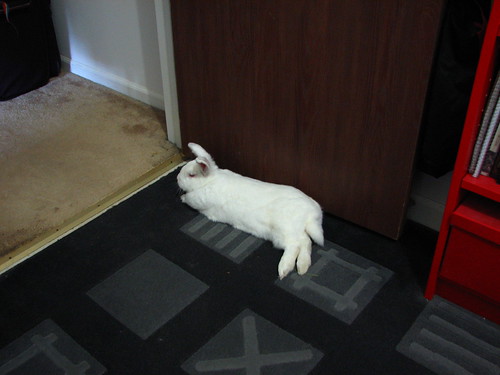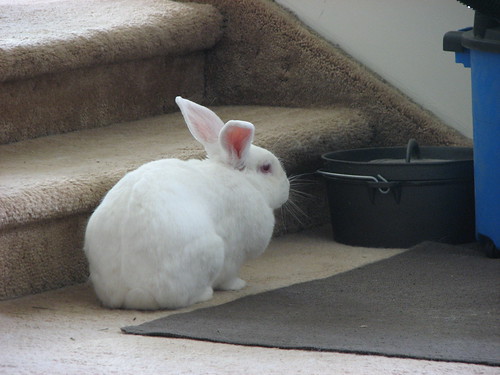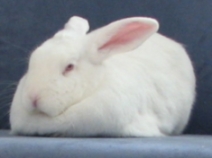Apparently it’s Rabbit Awareness Week over in the UK, and while we don’t live there, we do have lots of bunny friends “across the pond,” and we always like an opportunity to increase people’s awareness of rabbits, so here goes.
Common Misconceptions about Rabbits
Rabbits are not as common a pet as cats and dogs (I have no idea why this is, but anyway…) and because of this, there is a lot of misinformation out there. That’s not to say that people don’t know things about rabbits, it’s just that the things they know are often completely wrong.
Rabbits eat nothing but carrots: I blame cartoons for this one. Rabbits eating carrots is like dogs chewing bones or mice eating cheese; yeah, sure, it might be something they like, but it’s not actually what they should be eating for every single meal. In cartoons, kids are almost always eating candy or ice cream, but in real life you wouldn’t feed a child nothing but candy and ice cream, would you? In other words, don’t use what you’ve seen in cartoons as an authoritative source for how you should care for a rabbit – or any other animal, for that matter!
Rabbits need to live in a hutch with a wire floor: This is horribly false, and comes about from people raising rabbits for food and thus not caring about their comfort and wanting to make cleaning up as easy as possible (thus maximizing the work/food ratio). Wire floors don’t work for rabbits, since we don’t have pads on our feet (just fur). If it wouldn’t be comfortable for your feet, it won’t be comfortable for a rabbit’s feet. As for the “clean up” aspect, rabbits are easily litter-box trained (like a cat) so there’s no excuse (except laziness) for not giving a rabbit a solid floor and a nice clean litter-box.
Rabbits should be picked up by the scruff of the neck: I hate this one, and I really don’t know where people get this silly idea. What other animal do you always pick up by the scruff of its neck, anyway? Maybe kittens, when they are small, but still… we’re not kittens! And that goes doubly for when we’re grown up! Just… don’t do this! Pick up a rabbit carefully, supporting the whole body and especially the back feet. (Or better yet, don’t pick us up at all – we don’t particularly enjoy it. Well, at least I don’t!)
All rabbits love to snuggle and cuddle: This one is only wrong when you say “all rabbits.” Rabbits all have different personalities, and some of us enjoy cuddling, and some of us don’t. But even if we do like cuddling, be careful – we’re still (relatively) small animals and you are very much bigger than we are and you can hurt us by accident (children especially can make this terrible mistake).
Rabbits just need to be fed pellets and water: A lot of the misconceptions regarding rabbits seem to involve food. This one again comes from people raising rabbits as food. Pellets were originally developed to help rabbits grow big & fat quickly so they could be eaten. If you’re keeping a rabbit as a pet you don’t want to feed your rabbit pellets… at least, not all the time. Pellets are better these days and they do have vitamins and stuff, so a little bit here and there is OK, but I’d say they should make up less than a quarter of your rabbit’s diet.
Rabbits don’t live very long: This is a big misunderstanding that a lot of people learn about the hard way. The typical lifespan of an indoor, healthy house rabbit is about 8 or 10 years (plus or minus a few years either way depending on breed, size, etc.). The worst thing that can happen when people find out about this longer lifespan is that they get tired of the rabbit after a few years, and just try to dump it somewhere. There are precious few shelters for rabbits (not as popular as dogs and cats, remember?) and you can’t just let a domesticated rabbit go in the woods – the word “domesticated” isn’t there just because it sounds cool. If you’re not prepared to care for a rabbit for it’s whole life, maybe you shouldn’t get a rabbit in the first place.
Rabbits can be released into the wild and survive: wrong, wrong, wrong. I mean, just look at me:
 Do you think I could survive in the wild? I’d stick out like a sore thumb!! Plus, I am used to my food being brought to me twice daily in a nice, convenient bowl. What is this “foraging” thing you speak of? Like most domesticated rabbits, I would not stand a chance out in the wild without my bunny slave to take care of me.
Do you think I could survive in the wild? I’d stick out like a sore thumb!! Plus, I am used to my food being brought to me twice daily in a nice, convenient bowl. What is this “foraging” thing you speak of? Like most domesticated rabbits, I would not stand a chance out in the wild without my bunny slave to take care of me.
Ways Rabbits are like Cats
When dad needs a quick analogy for what a house rabbit is like to live with, he often says that we’re like “vegetarian cats.” This is a decent enough analogy:
- Can be easily litter-box trained
- Sleep/nap all the time
- Self-grooming (no baths required)
- Somewhat independent
- Can destroy your furniture with claws/teeth (but unlike cats, we can’t be “de-clawed”)
Ways Rabbits are like Dogs
OK, we’re not very much like dogs, but we do share a few common traits:
- Social animals (need either frequent attention from you, or a companion animal to keep us company)
- Need frequent exercise (though you can’t take us for a walk like a dog, we do need to run around – we can’t live cooped up in a cage/box all the time)
- Like to chew things – although as rabbits, we prefer wood/cardboard/paper/etc. to chew on instead of bones or rubber toys!
Ways Rabbits are like Horses
This one surprises a lot of people, but we have some traits in common with horses as well. Interestingly, a lot more people seem to understand the needs of horses better than that of rabbits!
- Can “go off our feed” – like a horse, if we stop eating, that’s a Very Bad Thing and we need to see a vet right away.
- Eats lots and lots of hay – we basically need fresh hay available to us 24/7.
Ways Rabbits are Totally Different from Cats and Dogs
Even though we share some similarities to cats and dogs (as far as what it’s like to live with us as pets), we are very different animals:
- Prey species: cats and dogs are predators. We are prey. This makes us very nervous and explains why we like to hide and don’t like being picked up or startled.
- Vegetarian: it goes without saying, but we don’t eat meat. We eat vegetables – dark green leafy vegetables. And lots of hay.
- Considered an “exotic” pet by most vets: unfortunately this means your vet bills are going to be higher. Be prepared for it.
- Teeth grow constantly: this is part of the reason why we need to chew on things constantly. Give us stuff to chew on or we’ll find stuff to chew on. Or, if we aren’t allowed to chew on anything, eventually we won’t be able to eat and you’ll end up with a very big vet/dentist bill.
Get More Information about Rabbits from the House Rabbit Society
I hope I’ve helped raise your awareness of what it’s like to own and live with a rabbit – at least a little bit. Or, if you already knew this stuff, I hope you can pass it on to someone who doesn’t!
If you want more information (and if you are thinking of living with a rabbit, you absolutely should get more information – I’ve only scratched the surface here), check out the House Rabbit Society or your local house rabbit organization.
You can also read our bunny blog or one of the many other bunny blogs out there (some are linked on the right side of this page) to get a feel for what it’s like to share your house with a rabbit.
OK, that is all. Leave treats on the floor, and no touching please.
-Gus
p.s. feel free to leave your own little tidbits about rabbit awareness in the comments if you’d like!


Comments
6 responses to “Rabbit Awareness Week”
Gus, we are sending a package of treats for you, that was a well done, but short and concise, yet comprehensive without being boring, bit of writing on a very, very important topic.
Thanks for the cogent statement on bunny needs, Gus. (Hope your dad is recovering nicely from his surgery and will be able to dispense treats in the manner to which you have become accustomed.)
Thank you for that, Gus. Now, I don’t have to do it. 🙂 Especially since I couldn’t do it as well as you.
Well put Gus. You forgot – Cats are weird.
Well done Gus! Great Job! Actually I may print out a copy of your blog post (with proper attribution) and bring it the next time I volunteer.
Good job Gus! Raising buns is hard work, isnt it?